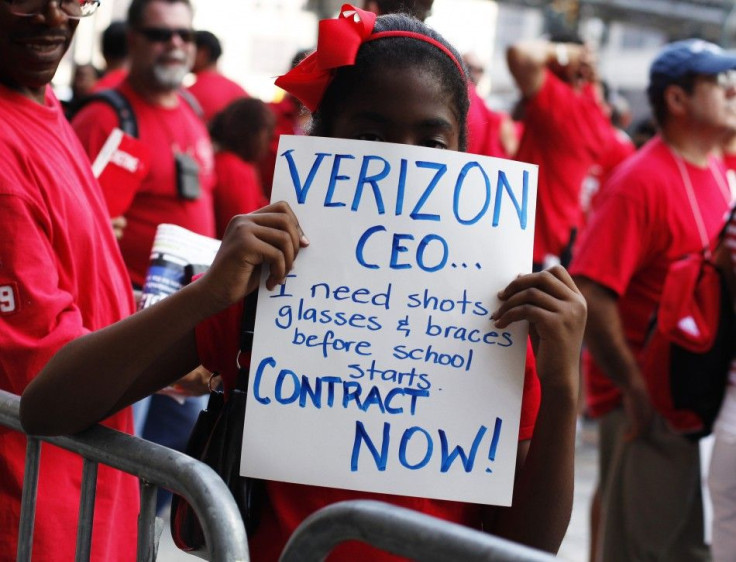Verizon Strike: For Union, Professional 'Life or Death' at Stake

For 45,000 landline Verizon workers entering their second week on the picket line, contract negotiations with the communications company is a matter of professional life or death, according to a local union president.
Some will have you believe differently, that workers are striking over health benefits, he says, but it is not so.
"This one is about our survival," said Ed Fitzpatrick, president of the International Brotherhood of Electrical Workers union Local 2222, which represents striking Verizon workers, in the Boston Herald.
Fitzpatrick echoed sentiments collected recently by the IBTimes from striking Verizon workers on a Manhattan picket line. Workers said the health benefits issue is merely a smoke screen. The real issue is the future of union landline jobs with Verizon, they say.
Verizon earned 57 cents per share in the second quarter, and company chairman and CEO Ivan Seidenberg claimed it was one of Verizon's "best quarters since the 2008 economic downturn."
But the company's landline business has been in decline, and Verizon wants to reduce costs. Management is seeking "reasonable" concessions from landline workers in the new contract as a result, the company says.
Amid tense talks, Verizon spokesman has said striking union workers must give concessions on its 100-percent company paid health care plan and increased flexibility on pensions and the ability to move workers.
Verizon has successfully obtained court injunctions limiting the size of picket lines and accused some striking workers of disrupting the company's work and service flow.
The FBI is investigating reports of sabotage, including the cutting of landline wire by agitated striking workers, which reportedly interfered with the phone service of thousands of customers between Virginia and Massachusetts.
Like striking workers interviewed on the picket lines, Fitzpatrick said the strike isn't just about health benefits.
"We are willing to pay for a portion of our health care like everyone else," said Fitzpatrick, in the Boston Herald. "But our members are terrified, and if we accept the contract they offered we will not exist in two years."
Union workers are concerned over the company's push to change the contract, allowing it to move workers more freely. Many feel Verizon is simply seeking to gain flexibility in the contract so the union can be wiped away over time, shifting work to non-union workers.
Thus, Fitzpatrick argues the strike is over Verizon's attempt to eliminate job security for union workers, freezing pensions and effectively union busting.
© Copyright IBTimes 2024. All rights reserved.





















